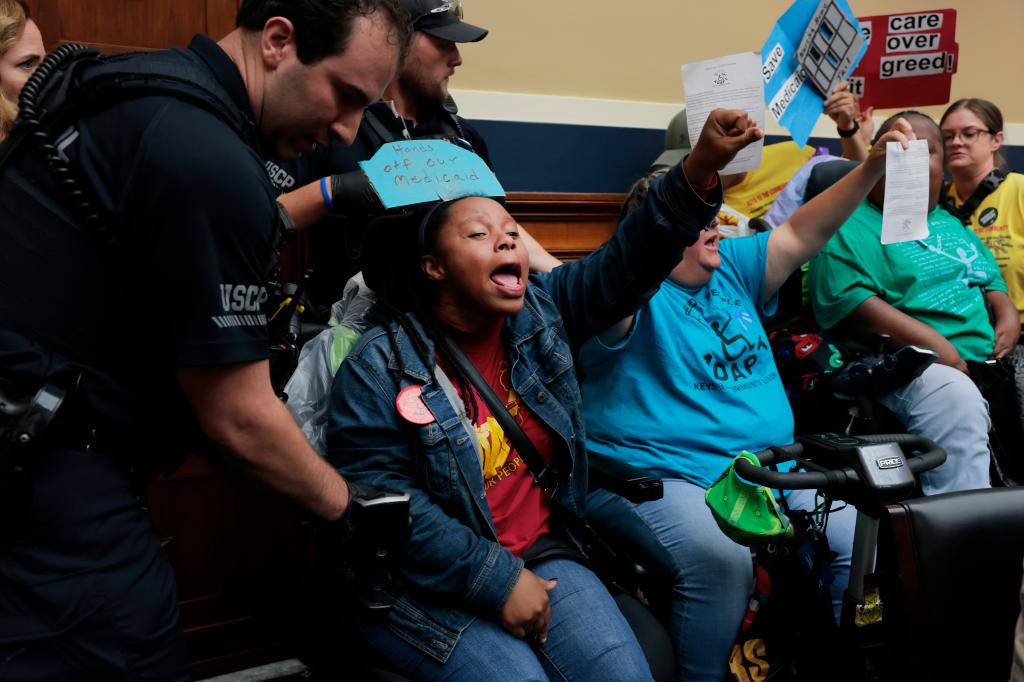House lawmakers debate Medicaid reform, SALT deductions caps in contentious, marathon markup sessions for Trump’s ‘big beautiful bill’
Markup hearings for President Trump’s “big, beautiful bill” dragged late through the night Tuesday into Wednesday as House lawmakers debated how deep to cut government spending in the massive piece of legislation.
The details the three House committees – Ways and Means, Energy and Commerce and Agriculture – sought to iron out include some of the bill’s most continuous aspects – including a dramatic Medicaid overhaul, reforms to the Supplemental Nutrition Assistance Program (SNAP) and how to handle state and local tax (SALT) deductions.
The hearings also brought a group of protesters to DC.
Capitol Police arrested more than two dozen demonstrators shortly after the House Energy and Commerce Committee markup kicked off at around 2 p.m.
The panel, tasked with coming up with more than half of the $1.5 trillion in total cuts House Republican leaders want to include in the megabill, was, several of whom were in wheelchairs, chanting, “No cuts to Medicaid.”
Twenty-six people were arrested for “Crowding, Obstructing, and Incommoding” inside and outside the hearing room, according to Capitol Police.
The changes to Medicaid Republicans are eyeing include a mandated 80-hour-per-month work requirement for able-bodied adults between the ages of 19 and 64; restrictions on large abortion providers from receiving funding; charging $35 per medical service on beneficiaries with incomes over the federal poverty line; and barring “middlemen” pharmacy benefit managers from charging higher prices than they actually pay for drugs.
The program, which had a roughly $618 billion federal budget in fiscal year 2024, provides insurance to more than 70 million low-income Americans.
The energy and commerce panel eclipsed 10 hours of debate as of press time and hadn’t yet voted on moving its section of the legislation forward.
Likewise, the House Ways and Means Committee was still debating provisions past the stroke of midnight, after having started at 2:30 p.m. Tuesday.
The GOP-led panel had rejected every amendment offered by Democrats, including an effort by Rep. Tom Suozzi (D-NY) to increase the SALT deduction cap to $80,000 and pay for it by hiking the tax rate on top earners from 37% to 39.6%.
As currently written, the reconciliation package would raise the current $10,000 SALT deduction cap to $30,000 on individuals with taxable annual income of $400,000 or less – but that’s not enough for several blue-state lawmakers, including several members of New York’s GOP congressional delegation.
House Speaker Mike Johnson (R-La.) was optimistic that a deal would be brokered by Wednesday on an acceptable SALT cap.
“It will probably be tomorrow only because we need the joint tax people, the number crunchers, to do all of that work tonight, and we’ve asked them to do a lot,” Johnson told reporters, according to . “We’re looking at different facts and figures, so I suspect the final analysis will be tomorrow.”
Reps. Nick LaLota (R-NY) and Mike Lawler (R-NY), who last week described the $30,000 cap as “insulting,” also signaled that progress was being made.
“Constructive dialogue, more good faith in that room than there was in previous rooms, still a lot of work to do, but we actually got into some specific numbers,” LaLota told reporters. “We did talk about some variable, different than what’s in the Ways and Means bill right now, but it’s still far from what we would accept.”
The congressman added that it appears Ways and Means has a “couple hundred billion dollars” left to spare that “should help sure the SALT issue.”
Lawler described his SALT talk with Johnson as “productive” and said he expects to have “more dialogue at some point soon and see where it goes.”
Meanwhile, the House Agriculture Committee recessed late Tuesday night without voting to move the bill forward.
The panel, tasked with slashing at least $230 billion in federal spending, is proposing having states pay for a percentage of SNAP benefits that would be determined by their payment error rates, along with covering more of the administrative costs associated with the food stamps program.
The committee has also proposed changing work requirements for SNAP.
When the three panels vote to approve their sections of the legislation – which also aims to extend Trump’s first-term tax cuts and fund the president’s border security and energy agenda – it will move on to the House Budget Committee.
If the budget panel, which will put the behemoth bill together, approves the legislation, it will then go to the House floor for a vote.

















